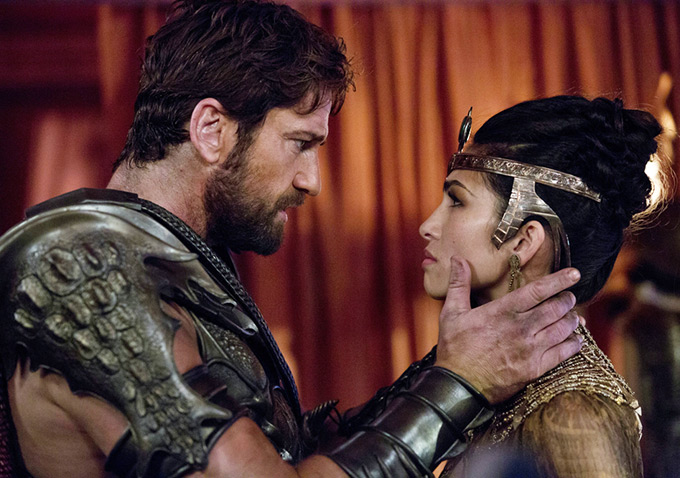The sort of insanely absurd, over-the-top genre mash-up that might have been produced by the Cannon Group — those purveyors of cheesy ‘80s schlock — had they been given a gargantuan studio budget, “Gods of Egypt” reimagines pre-ancient Egypt as a time in which mortals were ruled by Gods, and magic reigned supreme across the land. Director Alex Proyas’ would-be epic has been slammed, pre-release, for its casting of Caucasian stars for a story told in the land of the Pharaohs — a choice for which Proyas and Lionsgate have already apologized — but such miscasting is merely part and parcel of a work that, at every turn, obliterates any pretense of history or reality in favor of larger-than-life make-believe madness. Aping films as far and wide as “300,” “Avatar,” “The Mummy,” “The Matrix,” “Dune,” “The Lion King,” “Prince of Persia,” and countless others, it’s a tale of vengeance between deities who stand nine-feet tall, shape-shift at will, and bleed gold, and of a resourceful human thief’s quest to rescue his beloved before she’s forever consigned to the afterlife.
READ MORE: Watch: A Reckoning Is Coming In New Trailer For ‘Gods Of Egypt’
To say there’s a lot of plot to “Gods of Egypt” would be a grand understatement, and its to Proyas and screenwriters Matt Sazama and Burk Sharpless’s credit that, despite seeming like it’s making everything up as it goes along, its fantasy story is simultaneously overflowing with nonsense and yet lucid in a just-go-with-it way. The primary narrative involves the quest of Horus (Nikolaj Coster-Waldau), god of the air, to exact revenge against his power-mad jerk uncle Set (Gerard Butler), who — on the occasion of Horus’ coronation to the throne — killed his dad, Osiris (Bryan Brown), took the crown for himself, and ripped Horus’ eyes out for good measure. To achieve his payback, however, Horus must first receive assistance from Bek (Brenton Thwaites), a plucky street urchin in an Aladdin mold (not to mention a skeptic of the god’s righteousness). Bek has stolen one of Horus’ eyes from Set’s booby-trapped fortress in order to trade it back to the god; in return, Bek wants Horus to resurrect his girlfriend Zaya (Courtney Eaton), who was killed for helping Bek commit this crime, and who’s now being shepherded by Anubis to the other side.
Bickering like an old married couple, Horus and Bek strike up an uneasy partnership on their quest to kill Set (Horus says he can cheat death and save Zaya if he’s king), though their banter is merely white noise amidst the film’s enveloping CG sound and fury. With its every setting, creature and effect created via computers, Proyas’ latest is an astoundingly artificial creation, and one that revels in its technological flights of fancy. So coated in glimmering gold that it often seems like ancient Egypt’s chief production designer was Donald Trump, the film indulges in one outrageously ludicrous sight after another: Horus and Set transform into anthropomorphic, armored beasts; obelisks climb to the heavens; sand serpents manned by snake-tongued women rampage across outdoor labyrinths; and a translucent boat in the cosmos is manned by Horus’ pony-tailed grandfather Ra (Geoffrey Rush), whose duty is to literally pull the sun around the Earth (which is flat!) while using his lance to blast away a demon that threatens, on a nightly basis, to destroy the barrier between the living and the dead.
READ MORE: There’s A Spaceship In ‘Gods Of Egypt’: 4 Clips From The Mythology Epic
Upon their journey, Horus and Bek cross paths with Hathor (Elodie Yung), the goddess of love, who shacked up with Set in order to spare Horus’ life, as well as Thoth (Chadwick Boseman), the god of wisdom, who delivers every arrogant proclamation with flamboyant flair. Throughout, “Gods of Egypt” drenches its every panorama of the desert, and clash scene between man and monster, in all-consuming CG that makes the proceedings — especially when experienced in 3D — feel like a videogame cutscene by way of a virtual-reality demo reel. The result is that Proyas’ characters come across as visually divorced from their surroundings, and his habit of using computerized zooms, pans, bullet-time gimmicks, and slow-motion to enhance his action only compounds the brazen phoniness of the proceedings’ every moment.
There’s an overabundance of everything in “Gods of Egypt,” most of it ill-fitting, and yet its plotting is sturdy enough to keep the material from devolving into abject incoherence. Furthermore, Proyas’ more-is-better aesthetics have a chintzy garishness that’s often endearing in a B-movie manner. There’s nothing profound — or, for that matter, original — to be found here, but the director slaps together so many fantasy and sci-fi spare parts, and then gives them such a crazed digitized sheen, that it’s hard not to begrudgingly respect the endeavor’s go-for-broke attitude. Populated by super-buff heroes and cleavage-baring heroines, and marked by performances that range from cornball (Thwaites) to bland (Coster-Waldau) to cartoonishly growly (Butler), it’s a spectacular mess that’s shameless in its desire to entertain through sheer, misbegotten excess. [C]

